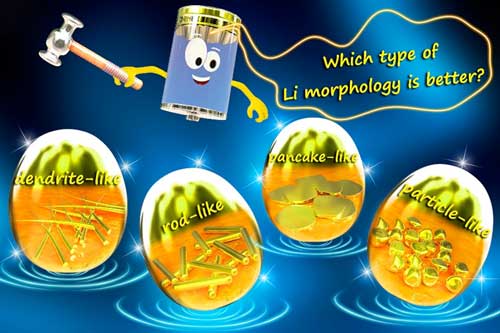| May 07, 2020 | |
Is dendrite-free lithium sufficient for next-generation Li metal battery technology?(Nanowerk News) Lithium metal battery (LMB) is a rechargeable battery using high specific-capacity lithium as an anode. It can potentially break the specific energy-density bottleneck of the current lithium ion battery technology due to its high energy-density property. |
|
| However, the formation of dendrite at lithium metal anode limits the application of LMB. As a result, achieving non-dendritic Li deposition is generally believed to be a prerequisite for the successful commercialization of LMB. | |
| Although a variety of strategies to prevent Li dendrite formation have been proposed, the following question arises: are dendrite-free Li based anodes sufficient to propel the LMB technology from laboratory research to massive industrial commercialization? | |
 |
|
| A variety of electrochemically-generated Li morphologies. (Image: SUN Fu and DONG Shanmu) | |
| A research team from the Qingdao Institute of Bioenergy and Bioprocess Technology (QIBEBT) of the Chinese Academy of Sciences (CAS) has answered this question through a short communication paper published in Materials Today ("Li-based anode: Is dendrite-free sufficient?"). | |
| In their previous work, the researchers have studied the working principles and decaying mechanisms of LMBs. They found that the irreversible transformation of Li anode during electrochemical cycling was the root cause for the observed battery performance deterioration. | |
| On the basis of previous studies, the authors revealed that eliminating the growth of the dendritic Li structure seemed not to be sufficient to propel the LMB technology from laboratory research to practical applications considering that there are other types of electrochemically generated Li structures besides the dendritic structure. | |
| The authors suggested that considerable efforts should be focused on studying the electrochemical nature of the generated Li structures, in addition to finding novel strategies to eradicate them. |
| Source: Chinese Academy of Sciences | |
|
Subscribe to a free copy of one of our daily Nanowerk Newsletter Email Digests with a compilation of all of the day's news. |
